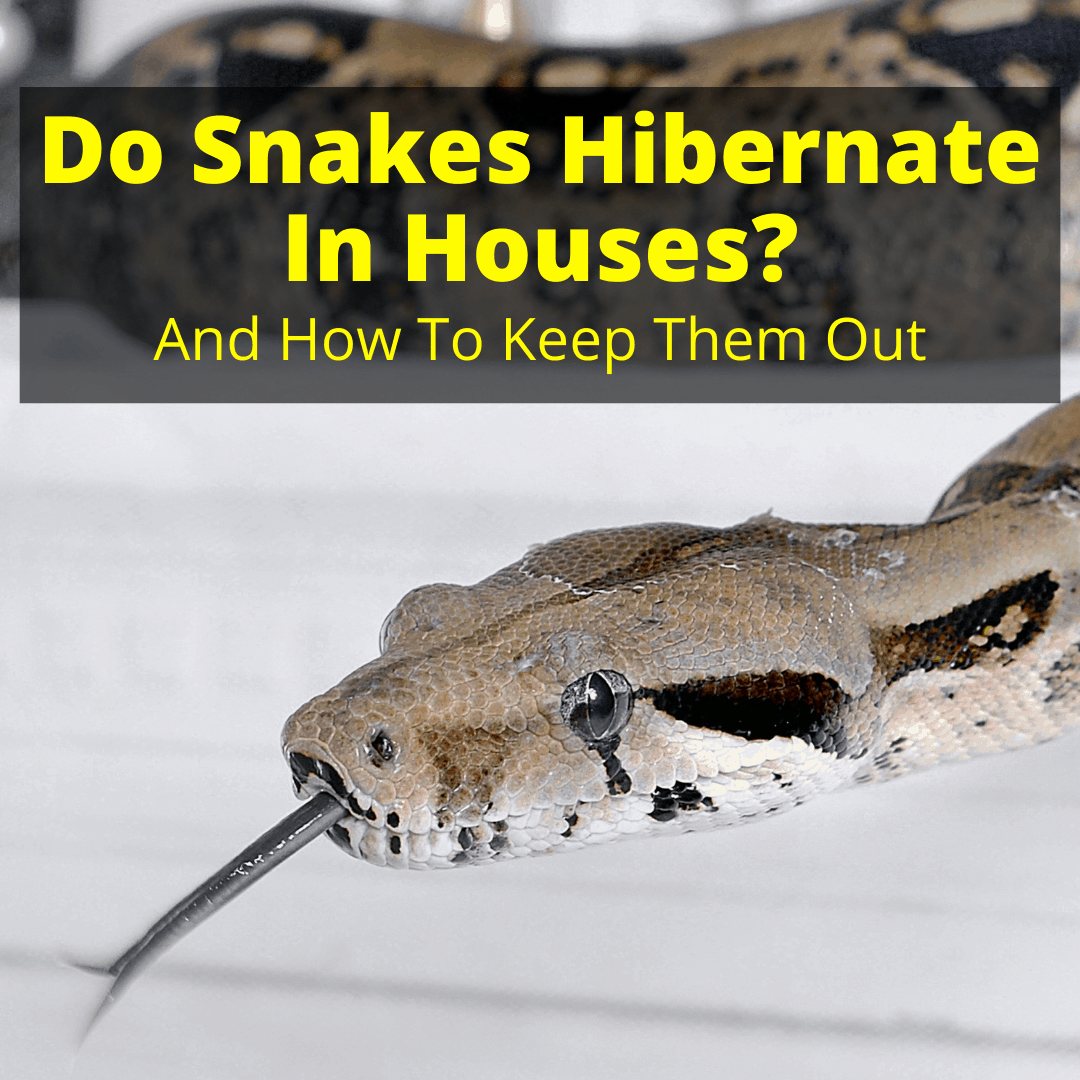
And probably not even knowing it!
It’s a common fear. And not an entirely unfounded one.
I mean, we know that snakes enter a hibernation-like state to conserve resources in the winter.
Because they are cold blooded, they need to hibernate in a location that is protected from the elements and warm enough that they don’t freeze.
Our houses meet these requirements. It only makes sense that snakes might choose you home as their winter getaway.
Let’s find out how common this is, and what you can do about it.
Table of Contents
Do Snakes Hibernate In Houses?
They do, but it’s not that common Before we get to that, let’s clear something up first: snakes don’t exactly hibernate.
Instead, the reptiles enter a state of decreased physiological activity known as brumation. You may also see this hibernation-like state referred to as torpor, dormancy, or wintering.
Snakes enter brumation to more easily survive harsh winter conditions and cold. In this state, they don’t use as much energy.
They also don’t have to eat as much or as frequently to sustain their physiological function. This is important because the food they like (such as insects or small rodents) is scarcer in winter.

To further increase their odds of survival in cold weather, snakes seek shelter in warmer spaces. They typically burrow into dens made by rodents, squirrels, or other snakes. They may also curl up under tree stumps and in caves or deep caverns.
In some cases, snakes may make their way into human houses for shelter.
Knowing what a snake nest looks like is not always easy, since they use just about anything for a den. Their main goal is to find somewhere safe and warm where they won’t be disturbed by snow, wind, rain, and cold.
While the snake doesn’t mean any harm by coming into your house, it can be an unpleasant surprise to find that a reptile has become your roommate.
Everything About Snake Hibernation
Snakes are cold-blooded animals. They thus naturally become less active in the winter because the cool temperatures make them sluggish.
By entering brumation, the animals take an additional step to maintain their health and survive this challenging season.
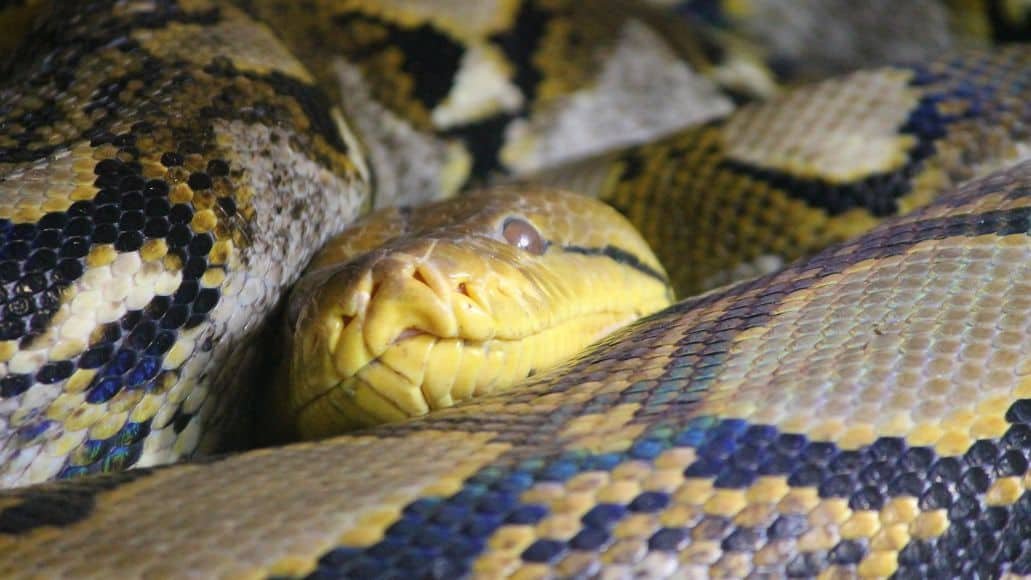
Here are the basic facts on snake “hibernation.”
What Is Snake Hibernation?
When a snake enters brumation, its breathing, heart rate, body rate, and metabolic rate all decrease. This conserves energy.
When Do Snakes Hibernate?
Exactly when and where a snake hibernates depends on the species and environment. For most snakes, brumation starts in late fall and ends in early spring. In temperate climates, snakes may skip brumation altogether.
Why Do Snakes Hibernate?
Snakes brumate to save energy. They can conserve valuable physiological resources to survive winter when temperatures are lower, and food is harder to find. They hunt less during this time and use up stored body fat for sustenance until the warmer season arrives.
Where Do Snakes Hibernate?
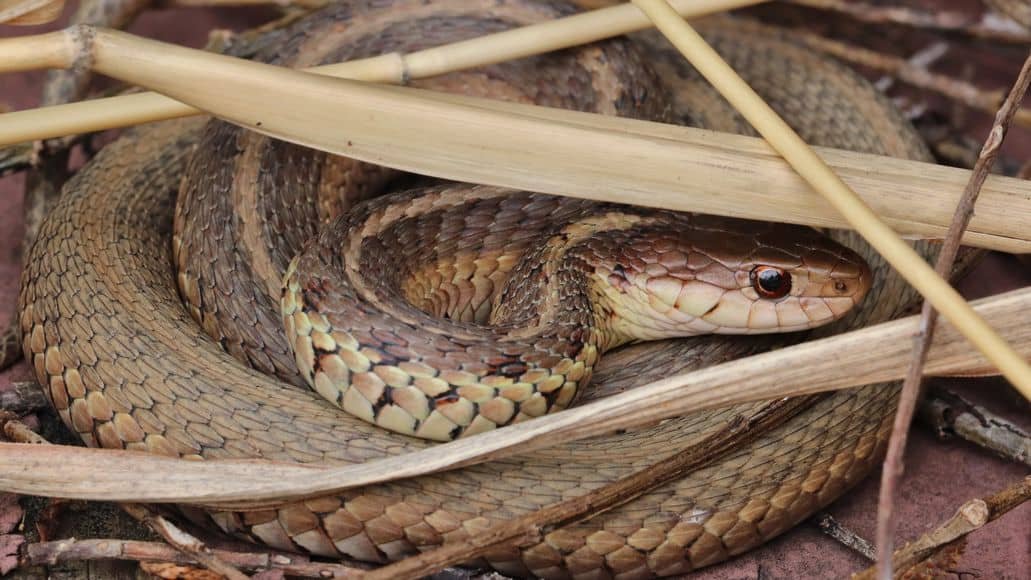
Snakes may hibernate in rodent nests, under tree stumps and logs, in rock crevices, and inside squirrel burrows. They may even hibernate in other snake dens. Sometimes, many snakes will hibernate together in a single shelter, lending each other warmth and safety in numbers.
In some cases, snakes will enter human homes for hibernation. You may find them in crawl spaces, boiler rooms, garages, pipes, storage spaces, sheds, barns, and basements. The animals may even make their way into car engines to stay warm. Woodpiles are another target.
How Do Snakes Hibernate?
To enter brumation, the snake’s breathing and heart rate slow down. If you see a snake in this state, it will be very passive and lazy.
Snakes Hibernating In Houses: Prevention And Risk Management
As mentioned, snakes may brumate (hibernate) in houses to stay safe from cold, rain, snow, and predators during the winter.
While the animals aren’t trying to harm you when they set up camp in your house, you probably won’t be too happy to discover a reptile living under your roof. Below, we discuss why snakes hibernate in homes, as well as prevention and risk management.
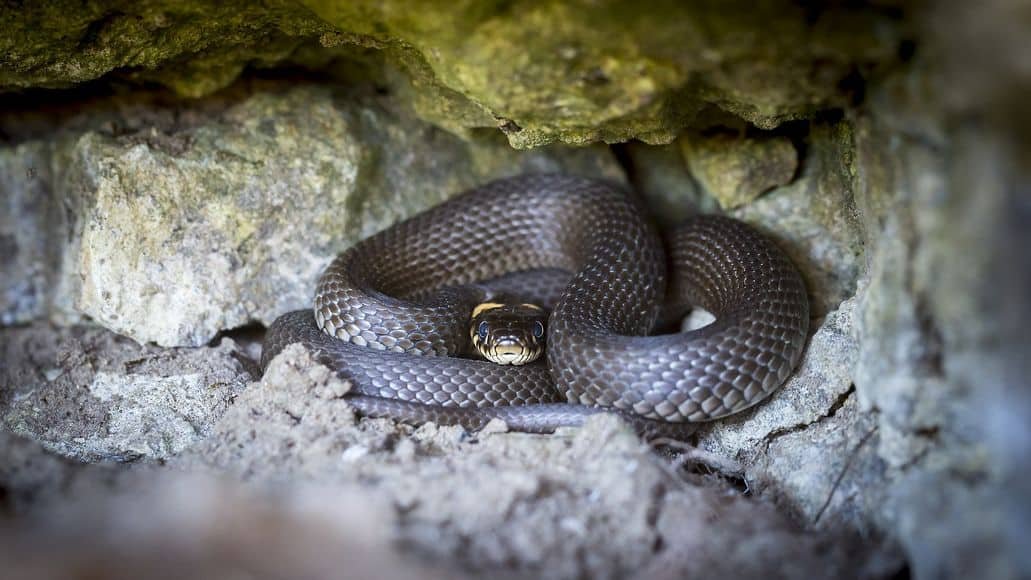
Why Snakes Might Hibernate In Your Home
Snakes seek a so-called hibernaculum to protect them in winter. This space needs to offer shelter from the cold, rain, wind, snow, and ice. Ideally, it will also provide easy access to nearby water and protection from predators.
A snake’s chosen hibernacula depends on its location. A rattlesnake living in a mountainous territory may seek shelter under rocks, while Northern Pine Snakes may visit the same underground den every winter.
If you have snakes living in your area, they may target your home as an ideal hibernaculum. Why? It meets all the criteria for a safe hibernation space described above—especially if it’s easy to infiltrate.
How To Keep Snakes Out Of Your Home
The best thing you can do to keep snakes out is to bar access. Ensure any entry points, like cracks in the foundation or broken windows, are sealed. If you have a crawl space or basement, make sure it doesn’t have any crevices where snakes can slither in.
Look for openings behind porches, steps, and where decks attach to your house. Also, check around the eaves and roof. You can use foam insulation to seal cracks if needed.
A snake fence or a good snake repellent can help as well. Don’t use the braided rope trick. That’s a myth and does nothing to keep away snakes.
We have an entire article dedicated to natural snake repellents, including snake repellent plants. That should give you some great ideas for keeping snakes off your property. A lot of natural snake repellents do work better than most chemical ones.
How To Tell If a Snake Is In Your House
Usually, you will only know a snake is in your house once you see it. These creatures will stay out of your way. They also don’t leave visible signs like some pests. For example, they won’t eat your food or leave droppings.
The one way you might discover a snake without seeing the animal itself is if it sheds some skin while in your home. This is one of the biggest telltale signs of a snake in your yard or home.
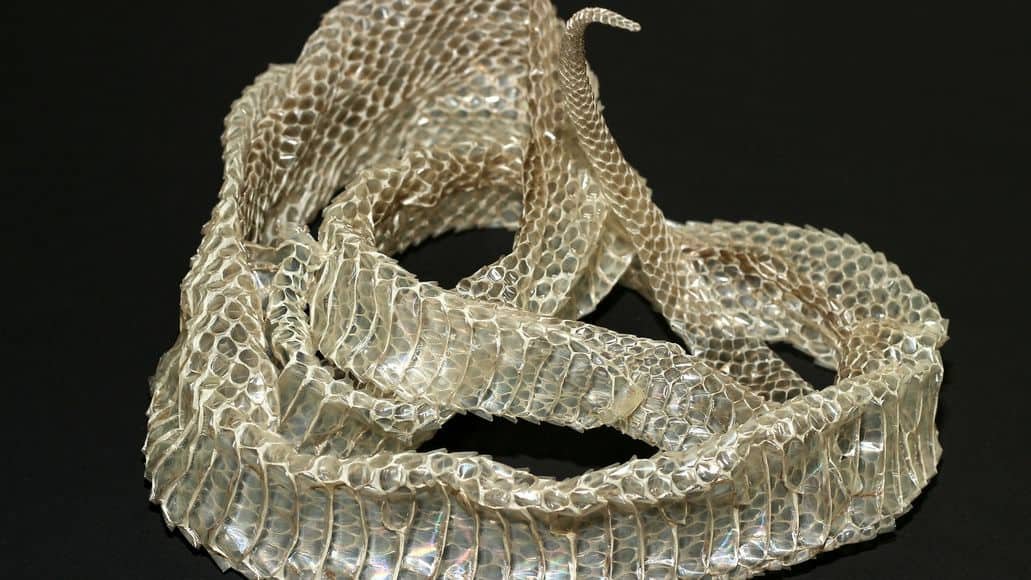
What to Do If You Find a Snake In Your Home
If you do find a snake in your home, don’t touch it. Although it’s probably not dangerous, you don’t want to take a risk on the off-chance it is venomous.
If it bites you, call 9-1-1 immediately. Try to get a picture of the snake so an expert can determine the breed and ensure it’s not dangerous. If you know the species and feel comfortable catching it yourself, get a good snake trap.
Call an exterminator to eradicate the animal safely. They will be able to identify the breed of the snake and remove them to a proper location.
An exterminator can also help you pinpoint how the snake got in to prevent re-entry. Although snakes don’t mean harm and don’t carry diseases like some other pests (e.g., cockroaches or rats), you probably don’t want this visitor coming again!
Snake Hibernating In Your Home: Final Thoughts
It does happen that snakes hibernate in our homes, but it is not overly common, apart from certain areas where snakes are abundant, but natural hibernation spots are not. Usually this is in Australia, as I’m sure everyone could guess.
If you do find a snake in your place in the winter, don’t panic. Since it’s winter, the snake will be lethargic to conserve energy and it won’t be looking for food anyway. Leave it alone and it will leave you alone, so call a snake removal expert and wait for them to remove the snake.
Leave a Reply